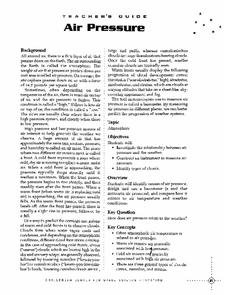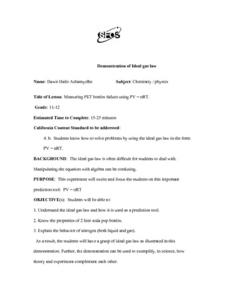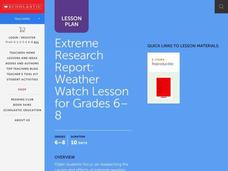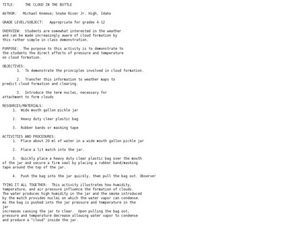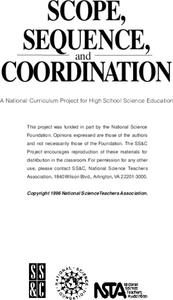NorthEast Ohio Geoscience Education Outreach
Density and Pressure of a Hot Air Balloon
Using a dry cleaner bag and a blow dryer, create a hot air balloon! The materials list suggests obtaining one dry cleaner bag per student, but since this is probably inconvenient, consider doing this as a demonstration during a lesson on...
Curated OER
#24 How Much Air Is In Foamed Polystyrene Products?
Students are challenged to come up with a good estimate of the amount of air in foamed polystyrene products. They use this gas evolution experiment and as such have students measure the gas generated when foamed polystyrene is degassed...
Curated OER
Warm and Cold Air
Students conduct an experiment to discover what happens to air when it is heated or cooled, discover that wind moves from a high-pressure area (an area of sinking air) to a low pressure area (an area of rising air).
Curated OER
Air Pressure & Barometers
Fourth graders observe, measure, and record data on the basic elements of weather over a period of time (i.e., precipitation, air temperature, wind speed and direction, and air pressure). Then, they make a barometer and keep record of...
Curated OER
Air Pressure
Students design and use a barometer to study air pressure. In this weather lesson, students identify the causes of air pressure. They design and use a barometer to determine how air pressure relates to air temperature and weather...
Curated OER
Too Heavy For Me
Students explore the different arrangement of air molecules in high and low air pressure masses. They compare the temperature of high and low pressure masses and discover how a barometer works.
Curated OER
The Cloud Case
Students discover how clouds form and how air pressure and air temperature affect their formation. The lesson plan is delivered in the story of Mike Breezy, Air Detective, who tries to solve The Cloud Case.
Curated OER
Ocean Currents and Sea Surface Temperature
Students use satellite data to explore sea surface temperature. They explore the relationship between the rotation of the Earth, the path of ocean current and air pressure centers. After studying maps of sea surface temperature and ocean...
Virginia Department of Education
Partial Pressure
At some point, everyone has been under pressure—even Dalton! Explore Dalton's law of partial pressures with young chemists as they measure the volume of air extracted from a sample compared to its original volume. Class members perform...
Curated OER
Air Pressure and Wind
Fifth graders study air pressure and learn how it can change the weather. In this air pressure lesson, 5th graders study the given diagrams and complete the experiments to learn how air pressure can change the weather. Students read...
Curated OER
Charles' Law
Students determine the validity of Charles' Law. In this Charles' Law lesson plan, students measure the volumes of a gas at two different temperatures. They determine the volume at a high temperature and predict using Charles' Law what...
Curated OER
The Power of Atmospheric Pressure Process
Students are introduced to the basic principles of atmospheric pressure. After watching demonstrations, they discover the capability of air pressure and how it affects weather. In groups, they use an inquiry template to solve different...
Curated OER
Demonstration of Ideal Gas Law
You know that liquid nitrogen turns into a gas at room temperature. Place some in a two-liter bottle for a physics demonstration of the ideal gas law. Beware, however; this is a dangerous demonstration! Not to mention that you may not...
Curated OER
Regents High School Examination: Physical Setting Earth Science 2008
Throughout this earth science exam, high-school geologists complete a series of multiple choice and short answer questions about the solar system, atmosphere, and earth system. This is an amazing test, as are all of the exams developed...
Curated OER
Pressure and Volume of Gases
Learners investigate pressure and volume as they relate to gases. In this pressure and volume lesson plan, students observe multiple demonstrations related to air pressure. The develop an understanding of the relationship between...
Curated OER
Causal Patterns in Air Pressure Phenomena
Students consider the relationship between pressure and temperature. They observe a demonstration and explore the relationship between heat and volume when pressure remains constant. Students discuss relational causality and consider...
Curated OER
Extreme Research Report
Investigate weather facts and figures to determine what has caused particular climate conditions. Research air pressure, temperature, wind, and humidity. Conduct online research to determine what air pressure, wind, temperature, and...
Curated OER
Relationships: Pressure, Volume and Temperature
Tenth graders investigate the relationships of pressure and volume and pressure and temperature of gases. In this gases lesson plan, 10th graders use an inflated balloon to show the relationship between volume and temperature of the air...
Curated OER
The Cloud in the Bottle
Students observe a demonstration of how pressure and temperature affects cloud formation.
Curated OER
Air Pressure
Fourth graders observe a demonstration experiment showing air pressure. They explain air pressure by completing the worksheet.
Virginia Department of Education
Charles’ Law
Searching for a relatively interesting way to demonstrate Charles' Law? Here is a instructional activity in which pupils heat air inside a flask and then cool the flask to quickly cool the air. They make observations about what occurs...
Curated OER
Gas Laws
A series of attention-grabbing demonstrations and lab activities is outlined in this document. Through them, chemistry kids appreciate the behavior of gases. Inflate balloons, marshmallows, and toothpaste tubes without adding air! Use...
Curated OER
Bicycle Pump Pressure
Young scholars explain that air pressure applies a force. If any of students have flown in an airplane, they have felt the "popping" of their ears caused by the change in atmospheric pressure because of the altitude changes.
Curated OER
Blowin' in the Wind
Students discover how wind is created on earth: changes in temperatures and air pressure. They list good and bad effects of the wind and make a weather vane and practice using it for 2 weeks.






